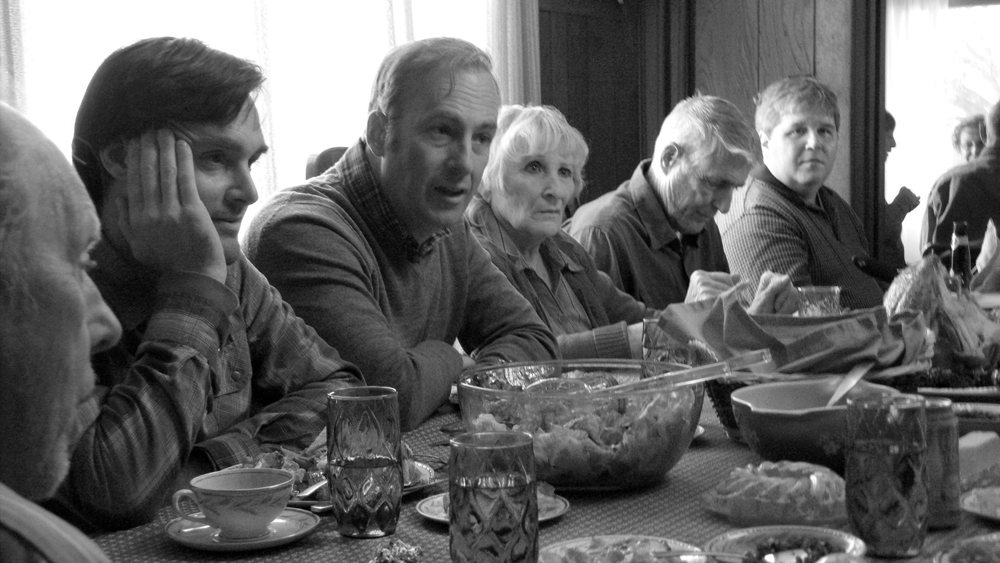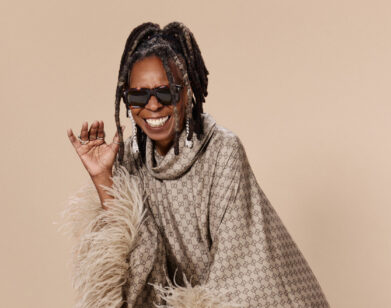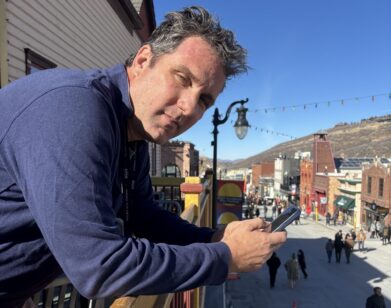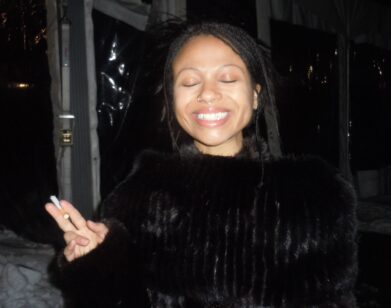Long Way Home

ABOVE (LEFT TO RIGHT): WILL FORTE, BOB ODENKIRK, AND JUNE SQUIBB IN NEBRASKA.
Bob Odenkirk, now 51, has had several careers: stand-up comic; writer for Saturday Night Live, The Ben Stiller Show, and Late Night With Conan O’Brien, among others; half the creative force and co-star, along with David Cross, of the cult mid-’90s HBO sketch-comedy series Mr. Show With Bob and David; and actor, most notably as the scene-stealing Saul Goodman on AMC’s Breaking Bad, and a concerned father figure in Jame Ponsoldt’s Sundance favorite, The Spectacular Now. For his latest role Odenkirk plays against type as Ross, a Midwestern news anchor and son of an alcoholic father (played by Bruce Dern) who’s intent on claiming the prize money he thinks he’s won, in Alexander Payne’s bittersweet Nebraska.
EMMA BROWN: How did Alexander Payne entice you into doing the film?
BOB ODENKIRK: He said, “I’m Alexander Payne.”
BROWN: Of the actors in Nebraska, you, Bruce Dern, and June Squibb are all from Illinois. Do you think it’s a coincidence?
ODENKIRK: Not at all. People from the Midwest are tempered by a certain amount of humility; it definitely feels like you’re in an out-of-the-way place and you’re not a part of the movers and shakers of the world. Bruce is an incredibly humble guy who, as proud as he is of all the work he’s done and all the people he’s worked with, I think always feels like a guest at the party. He shouldn’t feel that way—he is the party.
BROWN: Was it hard not to pick his brain about the good old days?
ODENKIRK: He picks his own brain about the good old days. He is just endlessly entertaining and clearly enamored with what we all do for a living. You just sit near him and you get to hear a run of stories and insight into people and technique.
BROWN: What was the best story he told you?
ODENKIRK: Can I tell his stories for him? I’m sure he would tell it better, but he told touching a story about Marilyn Monroe asking him to walk her home in the rain. He offered to get a cab and she said, “No, I like to walk.” This was before she was hugely famous, she was at Lee Strasberg and Bruce was taking classes there as well. He took her to where she was staying and a famous actress was pulling out of the apartment they were walking into. And he turns to Marilyn and she was crying and he said, “Why are you crying?” And she said, “She doesn’t know who I am.” She was so distraught over not being even known yet by this person she idolized. He said it was very childlike; it was kind of sweet and sad how much she needed that approbation. It was a touching story the way he told it, and made her feel sorry for her and how fragile she was. So that was a real cool glimpse into a private moment. He told so many great stories.
BROWN: I heard that, when designing the wardrobe for Bruce’s character, the costume designer started with the shoes. What did they start with for your character Ross?
ODENKIRK: My character is most cosmopolitan of the group. He is a public persona and he’s aware of it. He’s not completely out of the loop, but he’s still a Midwesterner and he’s not on the cutting edge. So it was a little tricky to figure out whether he wears a Members Only jacket or a knock-off of a Members Only jacket because he can’t afford a real one.
BROWN: Ross is more overtly angry with his father, Woody, than his brother [played by Will Forte]. Do you think it’s because he is the elder son?
ODENKIRK: I don’t know if it’s being older or the fact that, when one person’s angry, it allows the other person to be forgiving. Ross made it possible for his younger brother to be more understanding because he was expressing the frustration and the rage for both of them. It probably makes it harder for Ross to forgive him, too. Until other people shoulder some of that burden and share in his perception, it can be hard to shift to a different emphasis. My dad had an alcohol problem and I related to this a lot. When I was 14 years old, I kicked my dad out of the house one night. I was very angry at him. I didn’t have to dig to find that feeling.
BROWN: Was it painful to revisit?
ODENKIRK: Yeah, but it’s right there. Just because you’re not acknowledging or thinking about it doesn’t mean that it’s gone. I wanted to play this character.
BROWN: I loved your part in The Spectacular Now. Why did you decide to make that appearance?
ODENKIRK: The story really got me. Again, alcoholism is somewhat at the core of that story, so I related to all the sides of that. I certainly related to a person who has an alcoholic in their life who they care about and who they want to help, but realized that they have very little power to help them outside of expressing their love and their hope that the person makes difference choices.
BROWN: It took me a good 15 minutes to realize the protagonist always had a drink in his hand.
ODENKIRK: Yeah, me too. When you read the script there was the same effect. You’re reading the script and you’re kind of thinking, “This kid’s got it all together. He’s having a good time. [But] there’s something going on here that I’m not aware of.” You don’t know what it is and then you start to realize it, and it’s just devastating.
BROWN: Was it a coincidence that Saul mentioned Nebraska in the second to last episode of Breaking Bad, or did you already know you were going to be in the film?
ODENKIRK: It was pure coincide. I mean, [Vince Gilligan] knows I’m in the movie, but I think he just wanted to send Saul to a place where Saul would be really uncomfortable. Saul would not fit in in Omaha.
BROWN: I was watching a mash-up Saul’s funniest lines. Do you have a favorite one that you got to say as that character?
ODENKIRK: Yeah, I love when Jesse gets beat up and Walt enters the hospital room and Saul says to Walt “Congratulations—you’re the cute one of the group. Paul, meet Ringo. Ringo, Paul.” It’s a great moment and funny as hell, and just awesome.
BROWN: When did you first get involved in sketch comedy?
ODENKIRK: For school, in seventh grade, I started writing sketches as a way to do projects. I did a sketch about Ghana, the famous Chicago fire, Abraham Lincoln. They went over big.
BROWN: The Chicago fire doesn’t sound like a very funny subject.
ODENKIRK: I made it funny. Comedy is tragedy plus timing. There’s plenty of both in that story.
NEBRASKA IS OUT NOW IN LIMITED RELEASE.






